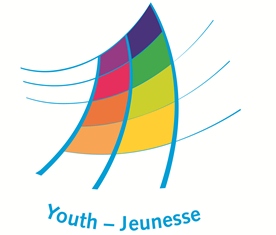Multilateral measures
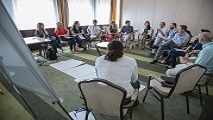
European University on Youth Policies
(Summer University)
Summer universities are for CDEJ and Advisory Council on Youth (CCJ) members, as well as other civil servants with an interest in the thematic focus. They introduce to the participants European approaches to youth policy and the values, objectives, programmes and structures of the Council of Europe and its Youth Department, as well as those of the European Union. Participants learn about the reality of young people, youth policy and youth work of the host country and have the opportunity to exchange knowledge and views on youth policy issues, and to offer peer advice and network.
States interested in hosting a Summer University should contact the CDEJ Secretariat.
Summer University 2017, 29-31 August 2017, EYCB
In 2017, the Summer University focused on the core Council of Europe standards for youth policy: access to rights; disadvantaged young people/social inclusion; youth participation; youth mobility and information; youth work. Forty representatives of ministries responsible for youth issues and of youth organisations from across Europe took part, improving their understanding of European approaches to youth policy and exchanging knowledge and views on youth policy issues relevant to the debates taking place in the Council of Europe youth sector.
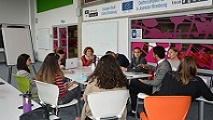
Seminars
The Youth Department organises “one-off” seminars and activities to explore specific issues and priorities. Sometimes, these activities are organised in or by states at the CDEJ’s request, with the programmatic and/or financial support of the Youth Department. Activities of this kind are advertised on a regular basis on this website. They are generally organised on the principle of open participation through an online application or registration procedure.
States wishing to co-organise such an activity should contact the CDEJ Secretariat with their proposal, indicating how it responds to the youth priorities of the requesting State. Costs are usually shared between the Council of Europe and the state.
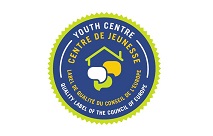
Quality Label for Youth Centres
Youth centres in member states and states signatories to the European Cultural Convention which subscribe to and promote the values and youth policy priorities of the Council of Europe can apply for this Quality Label. This Label lays down certain educational and policy standards, thus encouraging existing or planned youth centres to develop the quality of their offer. A network of labelled youth centres promotes international networking and exchange and promotes quality standards in non-formal education and international youth work, and access to specialised training. The Label has gained both social and political recognition across Europe as a sign of excellence in youth work.
For more information, visit the Quality Label’s webpage.
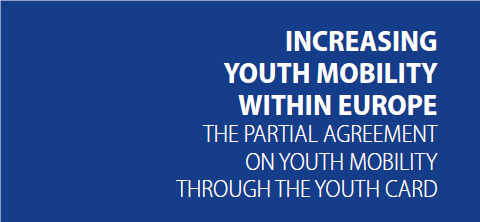
The Partial Agreement on Youth Mobility through the Youth Card
A Partial Agreement allows member states to join or abstain from a certain activity advocated by other member states, it has its own budget and working methods which are determined only by its members.
The Enlarged Partial Agreement on Youth Mobility through the Youth Card was set up in 1991 following the Council of Europe conference of ministers responsible for youth in Lisbon, Portugal, which advocated an increase in youth mobility. The aims of the Partial Agreement are to:
- facilitate the mobility of young people and their access to the various goods and services necessary for their personal and cultural development through a youth card scheme;
- foster the development of better youth policies with and for member governments.
For more information, visit the Partial Agreement’s webpage.

Secondments and traineeships
Governmental authorities’ staff can be seconded to or be a trainee in one of the European Youth Centres (Strasbourg or Budapest) in either the European Youth Foundation, the Education and Training Division or in the Youth Policy Division.
Secondments are advertised by the Council of Europe and are for nationals already employed in public service and who are often mid-career professionals. They are fully integrated into the Youth Department as full members of staff and have the opportunity to develop an understanding of the European perspective promoted by the Council of Europe.
More junior professionals, can apply for a traineeship which usually lasts from three to six months at one of the European Youth Centres, or with the European Youth Foundation. Trainees learn about the Council of Europe's approach to youth policy and youth work and receive on-the-job training and supervision by an experienced member of staff.
To find out more about secondments and traineeships, visit the Department for Human Resources’ website.



